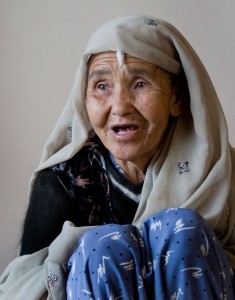psychological health
Sunday, November 7th, 2010
It’s been a long time since I last posted. I’ve been very busy, focused on preparing the photo exhibit which will accompany my presentation, Afghanistan, 2010, a View From the Ground here in Austin on Nov. 19th at Ventana Del Soul in Austin. (78741)
Now I’m to the point of proofing the images and working on the word panels containing each woman’s bio and an excerpt from her interview that will accompany each of 25 portraits. This stage of the process has been gratifying and revelatory as I get a chance to step back from the mass of images and words and look deeply into individual eyes and take in their messages.
For example, I see the strength and determination in Habbiba‘s face while I read about the death threats she received during her time living in a Pakistani refugee camp. She and her sisters had started an informal school for bored young kids who were acting out but elders in the camp threatened to kill her if they didn‘t stop. She also started a small business in the camp, bringing in items from the bazaar in Peshawar to sell, which earned enough money to enable her and her family to move out.

And there is the forthright look and single purpose of Rohina, who at 11 years old, is solely focused on her dreams of becoming a doctor and leading her family out of its hand-to-mouth poverty.

And Sakina, an 80 year old “internally displaced person”, (IDP) who returned to Kabul from a refugee camp in Pakistan. Her family couldn’t afford a house, so she now lives in an informal camp inside the city. I marvel at the determination in her face and the sparkle in her eyes.
In spite of her lifelong poverty and struggles with living in uncomfortable conditions and severe winter cold at her advanced age, she is still an active member of her family and complains that people don’t want to hire her to clean their houses because they think she’s too old.
To book the exhibit and/or presentation(s), email me at peggy@kelseys.net
Posted in Afghan Women's Project, AWP 2010, psychological health, refugees, women | Comments Off on
Depression
Sunday, August 22nd, 2010
Posted in AWP 2010, Other, psychological health, Uncategorized, women | 2 Comments »
